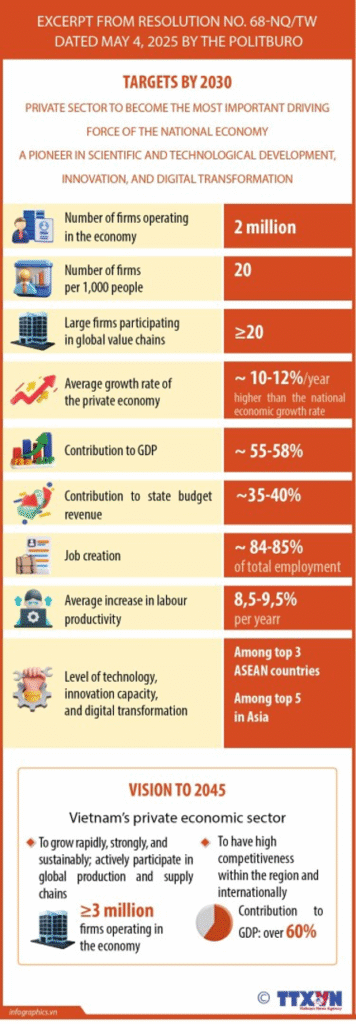
Resolution No. 68: An Institutional Catalyst for the Comprehensive Development of Vietnam’s Private Sector
After nearly 40 years of Doi Moi (Renewal), Vietnam has entered a new phase of development, with an ambition to become a high-income country by 2045. On this journey, the private sector plays a pivotal role. Resolution No.68 is seen as an institutional “push” to steer private enterprises toward comprehensive growth.
Introduction
In recent years, Vietnam has made significant strides in reforming its economic and institutional frameworks to foster the growth of its private sector. A landmark development in this endeavor is Resolution No. 68, which has emerged as a pivotal policy instrument driving the comprehensive and sustainable development of Vietnam’s private sector. This resolution represents a game-changing institutional catalyst designed to unlock the private sector’s potential and enhance its contribution to the country’s socio-economic progress.

Background and Context
Vietnam’s private sector, historically constrained by regulatory and institutional challenges, has long been recognized as a critical engine for economic growth, job creation, and innovation. However, the sector’s expansion has been hindered by bureaucratic inefficiencies, limited access to finance, and an inconsistent policy environment. To address these barriers, the Vietnamese government has prioritized reforms aimed at creating a more enabling environment for private enterprises.
Resolution No. 68, issued by the Vietnamese government, encapsulates these reform commitments. It aligns with Vietnam’s broader development strategy, which emphasizes private sector-led growth as a pathway to modernizing the economy and achieving higher levels of competitiveness in the global market.


Key Provisions of Resolution No. 68
The resolution outlines a comprehensive framework focused on institutional reform and practical measures to accelerate private sector development. Key elements include:
- Institutional Reforms: Simplification and modernization of administrative procedures to reduce red tape and foster a transparent, efficient business environment.
- Financial Support: Enhanced access to credit and financial services for private enterprises, especially small and medium-sized enterprises (SMEs), through tailored support programs and improved financial infrastructure.
- Market Access and Expansion: Initiatives to facilitate domestic and international market integration, enabling private businesses to expand their reach and competitiveness.
- Innovation and Technology Adoption: Promotion of innovation-driven growth by supporting technological advancement and digital transformation within private enterprises.
- Human Resource Development: Encouragement of skills training and capacity-building initiatives to elevate the quality of the private sector workforce.
- Legal and Regulatory Frameworks: Strengthening the legal protections for private enterprises, ensuring fair competition, and safeguarding property rights.
Impact and Significance
Resolution No. 68 has been widely hailed as a transformative policy with profound implications for Vietnam’s private sector. By addressing longstanding structural obstacles, the resolution creates a conducive environment for private enterprises to flourish. Early indicators demonstrate increased business registrations, heightened investor confidence, and expanded private sector participation in key industries.
Moreover, the resolution contributes to balancing Vietnam’s economic structure by reducing overreliance on the state-owned sector and empowering private actors. This shift is vital for sustainable economic resilience and inclusive growth, especially in the face of global economic uncertainties.
Challenges and the Path Forward
While Resolution No. 68 sets a strong foundation, successful implementation requires ongoing commitment and coordinated efforts among government agencies, the private sector, and other stakeholders. Challenges remain, including the need to enhance policy coordination, improve enforcement mechanisms, and continuously adapt reforms to the evolving economic landscape.
Ensuring equitable access to opportunities across regions and enterprise sizes is also critical to achieving the resolution’s inclusive development goals.
Source: Vietnamplus, Nhandan
Read more about Vietnam’s FDI in the first quarter of 2025 here.




Leave a Reply